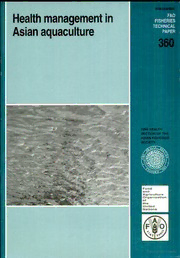
Health management in Asian aquaculture : proceedings of the Regional Expert Consultation on Aquaculture Health Management in Asia and the Pacific, Serdang, Malaysia, 22-24 May 1995 PDF
Preview Health management in Asian aquaculture : proceedings of the Regional Expert Consultation on Aquaculture Health Management in Asia and the Pacific, Serdang, Malaysia, 22-24 May 1995
ISSN0429-9345 Health management in Asian aquaculture FISHHEALTH SECTIONOFTHE ASIANFISHERIES SOCIETY Food and Agriculture Organization Of the United Nations Health management FAO FISHERIES TECHNICAL inAsian aquaculture PAPER 360 by RohanaP.Subasinghe FAOFisheriesDepartment J.RichardArthur DepartmentofFisheriesandOceans FISHHEALTH Canada SECTIONOFTHE MohamedShariff ASSOICAINETFYISHERIES UniversityPertanianMalaysia Malaysia ProceedingsoftheRegionalExpertConsultation Food onAquacultureHealthManagement aAgnrdiculture SinerAdsainaga,ndMatlhaeysPiaac,if2i2c-24May1995 tOoUfhrnegiatneidzation Nations This One Rome,1996 Copyrightedm ial Thedesignationsemployedandthepresentationofmaterialinthis publicationdonotimplytheexpressionofanyopinionwhatsoever onthepartoftheFoodandAgricultureOrganizationoftheUnited Nationsconcerningthelegalstatusofanycountry,territory,cityor areaorofitsauthorities,orconcerningthedelimitationofits frontiersorboundaries. M-44 ISBN92-5-103917-8 AllrightsreservedNopartofthispublicationmaybereproduced,storedina retrievalsystem,ortransmittedinanyformorbyanymeans,electronic, mechanical,photocopyingorotherwise,withoutthepriorpermissionofthe copyrightowner.Applicationsforsuchpermission,withastatementofthe purposeandextentofthereproduction,shouldbeaddressedtotheDirector, InformationDivision,FoodandAgricultureOrganizationoftheUnitedNations,Viale delleTermediCaracalla,00100Rome,Italy. ©FAO1996 Copyrightedmaterial PREPARATIONOFTHISDOCUMENT This document contains the technical papers presented at the Regional Expert ConsultationonAquacultureHealthManagementin AsiaandthePacific,jointly organizedbytheFishHealthSectionoftheAsianFisheriesSociety(FHS/AFS)andthe FislicryResourcesDivision(FIR)oftheFisheriesDepartmentofFAO,heldatUniversiti PertanianMalaysia,Serdang,Selangor,Malaysia,22-24May1995.Thedocumentalso containstherecommendationsmadeatliveExpertConsullalioaThefullreportofthe ExpertConsultationispublislicdintireFAOFisheriesReportNo.529(FAO,Rome, 1995,24p). Distribution: FAOFisheriesDepartment FAORegionalFisheriesandAquacultureOfficers FAOfieldprojects DirectoratesofFisheries FishHealthInstitutionsoftheAsia-Pacific Otherinterestedparties Participants. Copyrightedmaterial Subasinghc,R.P.;Arthur,J.R.;Shariff,M.(cds.) HealthmanagementinAsianaquaculture.ProceedingsoftheRegionalExpert ConsultationonAquacultureHealthManagementinAsiaandthePacific. Serdang,Malaysia,22-24May1995. FAOFisheriesTechnicalPaper. No.360. Rome,FAO. 1996. 142p. ABSTRACT In 1994,worldaquacultureproductionreached25.5millionmt,valuedatUS$ 39.83billion. Asiacontributed89.9%ofthistotal,andhassincecontinuedto dominateglobalproduction.Thedrivetoproducemorefishandshellfishtomeetthe growingdemandhasleadmanyaquaculturistsinAsiatointensifytheiroperations.In manyinstances,thecomplexbalancebetweenthefish/shcllfishandtheenvironmentis notwellunderstood,theorganismunderculturesubsequentlybecomingstressedand pronetoinfections.Aswehavealreadywitnessed,diseasehasbeenandwillcontinueto beamajorconstrainttothedevelopmentoftheaquacultureindustry.Consideringthe FAO'spriorityondevelopingsustainableaquaculture,thelargeAsiancontributionto globalaquacultureproductionandtheseeminglyhighlossesofrevenueduetodiseases andhealth-relatedproblems,FAO,inconsultationwiththeNetworkofAquaculture CentresintheAsia-Pacific(NACA),theAquaticAnimalHealthResearchInstitute (AAIIRI),theSouthEastAsianFisheriesDevelopmentCentre(SEAFDEC)andthe UniversiliPertanianMalaysia(UPM),andincollaborationwiththeFishHealthSection oftheAsianFisheriesSociety(FHS/AFS).organizedaRegionalExpertConsultationon AquacultureHealthManagement inAsiaand thePacific,whichwasheldat the Universili Pertanian Malaysia in Serdang. Malaysiain May 1995.Thisdocument comprisesthetechnicalpaperspresentedattireConsultation,andisasupplementtothe reportofliveconsultation,FAOFisheriesReportNo.529(FAO,Rome,1995.24p.) (Keywords:Asia,Pacific,Aquaculture,Fishdisease,Healthmanagement.Quarantine) Copyrightedmaterial V CONTENTS Pane PREFACE ConclusionsandRecommendationsofthe RegionalExpertConsultation vii TECHNICALPAPERS BetterHealthManagementintheAsia-Pacific 1 throughSystemsManagement MichaelJ.Phillips FishandShellfishQuarantine:theRealityforAsia-Pacific J.RichardArthur LI FishandMolluscHealthResearchintheAsia-Pacific: RPreRsenCtalSltiantausnandFuiurcDirections 29 ShrimpHealthResearchintheAsia-Pacific: PresentStatusandFutureDirectives CeliaRLavilla-Piiogo 41 RoleofNon-GovernmentalOrganizations(NGOs) MinFishHealthManagementintheAsia-Pacific ohantedShariff 5J TrainingandExtensioninAquacultureHealth ManagementintheAsia-Pacific:PresentStatus andFutureRequirements KamonpornTonguthai 60 HealthManagementStrategyForaRapidlyDeveloping ShrimpIndustry:AnIndianPerspective C.V.Mohan 25 AReviewofTheTraditionalandInnovativeAquaculture HealthManagementinthePeople'sRepublicofChina JiangYulin 88 Copyrightedmaterial VI Page AnOverviewofHealthManagementofColdwaterFish andShrimpinJapaneseAquaculture KiyoshiInouye 104 AquacultureHealthManagementinSingapore: CurrentStatusandFutureDirections FredericH.C.Chua 115 ShrimpFanninginSriLanka:HealthManagement andEnvironmentalConsiderations P.K.M.Wiieuoonawardena&P.P.Ci.S.N.Sirnvardenu 127 QuarantinePracticesUsedinPapuaNewGuinea forIntroductionsandTransfersofLiveFish UrsulaM,Kolkolo L40 Copyrightedmaterial vii CONCLUSIONSANDRECOMMENDATIONSOFTHEREGIONALEXPERT CONSULTATIONONAQUACULTUREHEALTHMANAGEMENTINASIA ANDTHEPACIFIC,HELDATTHEUN1VERSITIPERTANIANMALAYSIA INSERDANG,MALAYSIAINMAY1995(FAOFisheriesReportNo.529,Rome, FAO.1995.24p.) 4.1 Generalconclusionsandrecommendations 4.1.1 Inlightofthegrowingimportanceofaquaculturetoglobalfoodsupplyand economicwell-beingandthehighlysignificantcontributionmadebvtheAsian regiontotheworldaquacultureproduction,theconsultationrecognizedthatit isimperativetoensurethattheAsianaquaculturesectorisdevelopedina sustainablemanner. 4.1.2. Considering thepastexperienceswith diseaseproblemsandthe related eacnodnroemliacteldoshseeasltthoApsrioabnleamqsuaacrueltounree,otfhethceonmsouslttatsieornioaugsredeetdertrheanttsditsoeasthees sustainabledevelopmentofaquacultureinAsiaandthePacific. 4.1.3. Itwasrecognizedthatnotonlyhealth-relatedproblemshaveadirectbearing ontheaquaticenvironmentalquality,butalsothatthefutureoftheentire aquacultureindustrywilldependonthecontinuingavailabilityofwaterand otherresourceswithadequatequality. 4.1.4. Iheconsultationagreedthatthereisanurgentneedforaneffectiveregional healthmanagementprogramandsuggestedthreethrustareasforsucha program;i)Research,diagnosisandinformation,ii)Trainingandextension, andHi)Quarantineandlegislation. 4.2. Conclusionsandrecommendationsonresearch,diagnosisandinformation Aquaticanimalhealthresearchneedsforasustainableaquacultureindustryin AsiahavebeenrecentlyreviewedattheFishHealthManagementinAsia- PacificWorkshoporganizedbytheADB/NACAinPusan,SouthKoreain October1990andattheworkshoporganizedbytheFHS/AFSandSIFRduring theSecondSymposiumonDiseasesinAsianAquacultureheldinPhuket, Thailand in October 1993. The consultation endorsed the specific recommendations made at the workshops and emphasized that these recommendations should be considered when formulating future aquatic animalhealthresearchprogramsforAsia.Theconsultationrecognizedthe importance of regional cooperation in aquatic animal health research, diagnosisandinformation,andthefollowingrecommendationsweremade Copyrightedmaterial viii aftercarefullyconsideringthepastactivities,presentstatus,futuredirections, andtheinstitutionalandmanpowercapabilitiesintheregion. 4.2.1. TheAsianmarineshrimpcultureindustryliasexpandeddramaticallyoverthe pastdecade.Althoughthisgrowthisgeneratedbymarketdemandandshort- termgains,anditrepresentsonlyasmallproportionofglobalaquaculture production,thecontributionofthissectortotheCNFofdevelopingcountries intheregionissubstantial.Recently,therehavebeenanumberofsevere outbreaksofdiseaseinAsianshrimpculture,mainlyduetoviralpathogens, whichhavecausedseriouseconomiclossestotheregionalshrimpindustry. Consideringtheabove: Theconsultationreiteratedthatviraldiseasesofshrimpwereanextremely criticalissue,moresothanviraldiseasesoffishatpresent,andthatimmediate effortsmusthemadetode\’eIopresearchprogramstocombatviraldisease problemsintheAsianshrimpindustry.Italsorecognizedthatmedium-and long-termeffortsshouldseektodevelopthecapacityforresearchonfish viruses,assuchdiseaseproblemswouldlikelyoccurinthefuture. 4.2.2. InAsia,mostcountriesdonotappeartohaveadequateinfrastructurefor diseasediagnosisandresearchonaquaculturehealth.Amongthecountriesin theregion,therearcdifferencesinprioritizedspeciesandsystemsforculture. Thespecificemphasisgivenbythegovernmentsintheregionforestablishing nationalaquatichealthfacilitiesappearstovarywiththeircountry’seconomic status.Therefore: Theconsultationrealizedthattheprimaryresponsibilityforestablishmentand operationofnationalaquaculturehealthfacilities,includingdiagnosticand researchlaboratories,remainswiththenationalgovernments.Regionaland internationalorganizationsshouldbeencouragedtoassistgovernmentsin strengtheningsuchfacilities. 4.2.3. ThediseasediagnosisandresearchcapabilitiesfoundinsomecountriesinAsia and the Pacific are quite advanced. Trained diagnosticians, advanced laboratoryfacilities,andexcellentaquaculturehealthcentersarcavailableand arcfunctioning.Consideringthefactthatnational-levelcapacitybuildingin aquaculturehealthresearchanddiagnosisisalong-termobjectivetoachieve: IheconsultationstronglyemphasizedtheimportanceofstrengtheningAsia's regionalcentersinaquaculturehealthmanagementasashort-termactivity. Theparticipationofsuchcentersinsupportingcapacitybuildinginother countriesoftheregion,throughregionalcooperationstrategies,shouldbe strongly encouraged The consultation agreed that regional cooperative Copyrightedmaterial IX effortstowardsstrengtheningaquaculturehealthcenterscouldbefurther reinforcedthroughincreasedinternationalcooperation. 4.2.4. Regionalcooperationisencouragedtoaddressaquaculturehealthproblemsin Asia.However,aneffectiveregionalnetworkingmechanismwithrespectto aquaculture health management, which could bring effective regional cooperation,docsnotexist.Withtheexpansionofregionalaquacultureandthe morefrequentemergenceofdiseaseproblems,agoodnetworkingmechanism couldbeveryeffectiveandwouldstrengthentheregionalaquaculturehealth managementmechanism.Therefore Theimportanceofregionalnetworkingwasemphasizedasacost-effective means ofstrengthening the national capacitiesfor aquaculture health management. Increasedeffortsarerequiredtopromotetheexchange of information, training, technicalassistanceandexpertisetoenhancesuch regionalcooperativeactions.Ihesecooperativeexchangesshouldincludethe moretechnicallyach’ancedcountriesoftheregion. 4.2.5. InmostPacificcountries,aquacultureisstillinitsinfancy.However,the Pacificcountriesarcinterested indevelopingaquacultureand some have alreadyembarkeduponcomprehensiveprograms.Itisobviousthatwiththe developmentofaquacultureinthosecountries,diseaseandhealthproblems willemergeasmajordeterrentstotheindustry,ifpreventiveandmitigating measuresarcnottakenwellinadvance.Thus: TheconsultationemphasizedthatthePacificcountriescouldlearnfrom experiencesinthedex’elopmentofaquacultureinAsiancountries. 4.2.6. Therearcreportsfromtheregionabouthumanzoonosesrelatedtoaquaculture. Someinstitutionsarcalreadyaddressingsuchproblems, inparticularthe epidemiologicalaspects. Iheconsultationdiscussedthepossiblemeritsofresearchonhumanhealth aspectsofaquaticanimaldiseaseandrecognizeditsimportancetohuman well-being. However, it was noted that this subject way broader than aquaculturehealthmanagement,andtheconsultationrecommendedthatitbe lefttootherinitiatives. 4.2.7. Genetic manipulation and the development ofdiseasc/pathogen resistant strainshavebeenattemptedwithmanyfishandlivestockspecies,butwith limitedsuccess.Thepossiblebenefitsofworkonthegcncucaspectsofdisease werediscussed,particularlythepossibilityofincorporatingdiseaseresistance Copyrightedmaterial
